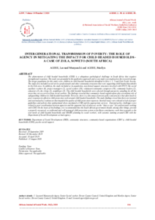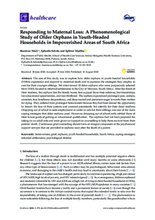childrens_living_arrangement
children_living_without_bio
Displaying 81 - 90 of 336
This article interrogates concerns regarding the South African government's strict lockdown and related legislation in response to the COVID-19 pandemic and the beliefs that it advanced children’s vulnerability to abuse and neglect.
The aim of this study was to explore the experiences and impact of the pandemic and the resulting social isolation on the wellbeing and protection of children living in a residential care facility.
This paper explores kinship and other networks of support for young mothers and their babies after an unintended, ex-nuptial pregnancy in a resource-poor urban setting.
This qualitative study, conducted in four child and youth care centres in the Tshwane region of South Africa, presents some techniques used by child and youth care workers to develop belonging.
This study explored child headed households (CHH) in South Africa.
The aim of this study was to explore how older orphans in youth-headed households (YHHs) experience and respond to maternal death and to examine the strategies they employ to care for their younger siblings.
This report outlines the peer research approach adopted by the Building Positive Futures project and summarises the findings of the pilot of the peer research methodology on leaving care in Africa.
This report is a short summary of the main findings from 'Building Positive Futures: A Cross-Country Pilot Study on Youth Transitions from Out-of-Home Care in Africa,' written for youth who participated and other interested young people.
Given the paucity of research on youth transitioning from alternative care (i.e. care-leaving or leaving care) in Africa, the study sought to develop and test a methodology for a cross-country, comparative study on leaving care in Africa.
In this first event of Family for Every Child's How We Care series, Family Members CINDI (South Africa), Conacmi (Guatemala) and Uyisenga Ni Imanzi (Rwanda) shared their approaches and experiences of providing psychosocial support to children and families during the COVID-19 crisis.





